Modular: Rethinking the OSR through Modiphius’s Conan – Adventures in an Age Undreamed Of
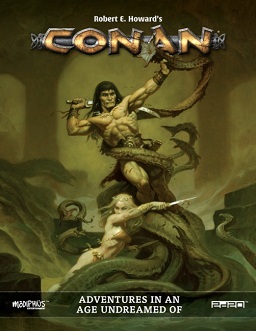 Well, many of you don’t need to be told that Mophidius’s Conan: Adventures in an Age Undreamed Of is out. Well, maybe it’s not quite out: for those of us who require a hard copy, word is it won’t be shipping until sometime in June. But backers and shoppers now have access to PDF copies of the Conan Core Book and a collection of adventures entitled Jeweled Thrones of the Earth.
Well, many of you don’t need to be told that Mophidius’s Conan: Adventures in an Age Undreamed Of is out. Well, maybe it’s not quite out: for those of us who require a hard copy, word is it won’t be shipping until sometime in June. But backers and shoppers now have access to PDF copies of the Conan Core Book and a collection of adventures entitled Jeweled Thrones of the Earth.
I became a backer quite late in the game. Indeed, it couldn’t have been much more than a month ago. I’m not sure why I was late. I’m almost certain I looked at the Kickstarter when it was announced but probably initially passed it over because I assumed that so much of the Conan material probably was done “better” (as in open to additional literary inspirations) in the “conventional” rpgs (D&D and its clones) with which most of us already are familiar.
Curiosity is what made me change my mind. Modiphius was offering free “Quick Start” rules in PDF form. I downloaded them and read them all, including the introductory adventure. Contrary to what some others on this site have reported, I was absorbed and excited by the rules set. I didn’t run the adventure because, well, I write my own adventures. And, outside of egotism, the main reason I don’t run other people’s adventures is because I can’t see how most of them can work. At one point in the introductory “To Race the Thunder” adventure, it reads,
With no hope of joining or rescuing the forces inside the fort, the player characters’ only hope is to strike out to the settlements, to warn the settlers, gathering them and helping them across the Thunder River to safety. The banks of the Thunder River are their only hope at this point, else they will all end up as corpses, cooling as their life-blood sinks into the black and hungry earth.
Are you kidding me? If my players are told they can’t possibly get into the fort, you can be certain that that is the one and only thing they obsessively will try. And with me as GM, they very likely will succeed.
And with that observation, I have come to the thesis of this article: rethinking the OSR in light of what I have learned from reading the new Conan RPG. The OSR, as many of us need not be told, stands for Old-School Renaissance (or Revival, or Roleplaying). And I am fascinated and excited by it. For the few of us who don’t know already, broadly speaking the OSR names a movement in the tabletop rpg industry that is regressive, perhaps nostalgic, a return to iterations of D&D that were popular before the third edition (or d20 system) of the rules. This return was facilitated by “retroclones” made legal under the Open Game License. Examples of retroclones are Swords & Wizardry, Castles & Crusades, Dungeon Crawl Classics and a host of others that might be impossible to enumerate. And to add to this OSR, players no longer need “return” to revised versions of the old rules but can purchase the actual old rules outright from Wizards of the Coast, because the latest owner of the D&D property now has released virtually its entire back stock in PDF and print form.
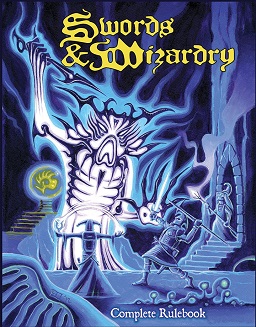 What makes the OSR movement more than one of mere nostalgia or “grognardian” inability to learn new tricks is the argument that the older systems were simpler, more “grokable” and more conducive to storytelling and true “roleplaying” through actual, simulated character interaction. In support of this you often will hear references to “rulings, not rules.” Or “okay, so tell me exactly how you do that?” And “we play to find out what happens, not according to a script.” The movement aims to simultaneously return more agency to the GM through simpler, more porous rules (hence the rulings) and to help the players feel like their choices “matter” more through their actual, role-played interactions with the game world rather than through over-reliance on mere die rolls.
What makes the OSR movement more than one of mere nostalgia or “grognardian” inability to learn new tricks is the argument that the older systems were simpler, more “grokable” and more conducive to storytelling and true “roleplaying” through actual, simulated character interaction. In support of this you often will hear references to “rulings, not rules.” Or “okay, so tell me exactly how you do that?” And “we play to find out what happens, not according to a script.” The movement aims to simultaneously return more agency to the GM through simpler, more porous rules (hence the rulings) and to help the players feel like their choices “matter” more through their actual, role-played interactions with the game world rather than through over-reliance on mere die rolls.
All well and good, right? All aboard, right? And I’m certainly on board. But here’s the rub. Does anyone besides me feel like references to OSR cannot be references to any games that are not older versions of D&D? I mean, does anyone think that OSR also can refer to, say, Tunnels & Trolls (well, that one certainly seems to be included) or Runequest or Rolemaster or GURPS or any of the other games that people might have been playing in the early days of the industry.
Because here’s the thing, I am one of those roleplayers who somehow never played D&D. Not until third edition. And even then, it is highly unlikely that I ever would have played D&D if it hadn’t been for the two-fold accident that a DM in my town, first, needed an experienced roleplayer to model the pastime for some newbie adults and, second, subsequently left that town and a group in need of a new DM, so…
My coming of age rpg experience is unlike so many others I read about not only because my gateway wasn’t D&D (getting to that in a bit) but because I had to discover — and understand — the culture all alone. So many rpg memoirs I read have an older brother or an older cool kid on the block who first introduces and teaches the to-be lifelong gamer the culture. Not me. I was that cool older kid on the block (well, maybe not so “cool” as the term was understood at the time — that’s one of the reasons I ended up becoming a gamer). For me, a suburban coming-of-age of existential crises and ennui was blessedly mitigated first by an introduction to C.S. Lewis in the third grade and then to J.R.R. Tolkien in the fifth grade. As I have shared so many times before, I had found my escape — my escape from modernity was fantasy and, specifically, Tolkien’s fantasy set in Middle-Earth.
But I wanted to escape even deeper. Rereading Lord of the Rings twenty or more times in half that many years certainly was helpful, but for full immersion I needed interaction. I wanted to be in that world, to make choices, to affect it. To do that I would become a kind of co-creator or contributor to Tolkien’s subcreation as I GMed Middle Earth Roleplaying. To my neighborhood I introduced not only Tolkien but roleplaying.
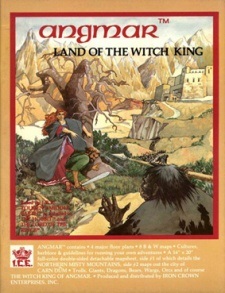 At this point my story becomes similar to many others writing about the OSR. It took me a long time to figure out what I was doing. A long time. My first roleplaying purchase actually was a “supplement” — the campaign module of Angmar that I thought somehow was supposed to go with the board game The Fellowship of the Ring. When I did finally get a copy of the MERP rules, we played it inaccurately and had to make rulings because of some rules that didn’t seem to exist. We made it our own.
At this point my story becomes similar to many others writing about the OSR. It took me a long time to figure out what I was doing. A long time. My first roleplaying purchase actually was a “supplement” — the campaign module of Angmar that I thought somehow was supposed to go with the board game The Fellowship of the Ring. When I did finally get a copy of the MERP rules, we played it inaccurately and had to make rulings because of some rules that didn’t seem to exist. We made it our own.
And later I played a host of other games — but none of them D&D. Why? Well, I have given more reasons elsewhere, but for my purposes here it was because D&D couldn’t do what I wanted. What did I want? I was a gamemaster, a writer. I wanted my players to experience a story, not a dungeon. (Yes, I understand that stories can take place in a dungeon, but wait.) I wanted my players to experience being heroes. I wanted their adventures to be structured, like the books and movies I liked so much. There had to be rising action and climaxes, heroic effort and setbacks, evocative settings and landscapes with character — and it all had to have internal consistency. It had to be believable (yes, perhaps an oxymoron in reference to fantasy games; focus perhaps on “probable”).
D&D, perhaps because of its origination, is its own thing, its own genre. It is the genre of the mash-up. Every possible thing that anyone ever has thought to be remotely cool, interesting or evocative is in there. The kitchen sink is in there. Elsewhere (actually, in the same link above) I have extolled this trait as a virtue. Here I reconsider it a setback. Well, let me soften that. If a gaming group wants to emulate a D&D experience, it should play D&D. D&D is a game about a group of ability-restricted, murderous, larcenous and amoral wanderers who descend into “dungeons” that, however improbable the reasons for their existence, are filled with bizarre and complicated traps, monsters and treasures. But if the game group wants something else…
So much thud and blunder, you say, signifying nothing. What’s your problem, right? There should be no problem. If you want to play D&D, play D&D. And if you want to play something else, there are so many games out there. Yes, there are. A nigh overwhelming amount of them. Just go check out DriveThruRPG. For a while there it seemed like there was nothing but Wizards of the Coast and companies catering to Wizards of the Coast (maybe White Wolf and some others diminished from their 90s grandeur). But now there are actual companies in direct competition again — Cubicle 7 with Doctor Who and The One Ring, to name just two of their masthead games; Modiphius with Conan and (upcoming) Star Trek and a host of others. Even as I drafted this post I received an email about an intriguing Quick Start called Coriolis. It boggles my mind that there can be a market for all this. Well, reading rpgs — even the rules — can be just as interesting (perhaps even more so) for me as reading a good novel. But do people actually play all these games outside of collecting them? How can they have the time? Recently I learned the virtue of the short campaign. I’m running one using Fantasy Flight’s Star Wars right now, and I’m loving it — and it’s partly for this reason that I know I’m going to love the Conan rpg, because it’s designed by the same person and the two systems have remarkable similarities. But I know the campaign is going to end just about at the time that I’m getting comfortable with the rules. I don’t know many players who like to try out new systems. I also know that players tend to get attached to their characters; it’s hard to leave them for other systems and other worlds.
So my rethinking about the OSR might be more of a meditation on human nature — its patterns and comfort zones — than on the actual merits or accident of the OSR being mostly about D&D. I think I wish that instead of an OSR movement there was an equally powerful “Polygamerous” movement that told players, “Hey, if you’re unhappy with your D&D game, don’t play another version of D&D. Play a different game.” But maybe so few people want a different game. I’ve attended only one gaming convention so far, Gamehole Con last fall. One of my impressions of that first experience is how overwhelming a D&D presence was there, and by extension this presence seems to impose on the overall rpg community. There was an entire room devoted to Pathfinder Society organized play. There was an even larger room dedicated to 5E D&D Adventurer’s League. The overwhelming majority of the rest of the games were iterations of this culture: I myself played an Astonishing Swordsmen & Sorcerers game and a Swords & Wizardry game. This year I’m signed up for Garycon. Out of the welter of D&D offered there I’ve managed to find a Doctor Who game, a Conan game and a Call of Cthulhu game. I’m signed up for those.
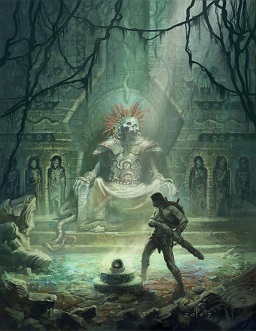 Obviously my thoughts in this piece are being informed by, first, my own preference for game experience, second, by my own rpg coming-of-age story, and, third, by my current region’s accessibility and availability to gamers. If I lived in a more cosmopolitan area like Minneapolis rather than Winona, perhaps I wouldn’t have these woes. Tired of playing D&D? No problem! People are playing every kind of game down at [name of relevant gaming store here]. Even someone’s homemade new indie game that he hopes to sell on DriveThruRPG might be available for playtest! Or maybe not. Again, judging by the prevalence of D&D at my one and only gaming convention so far, maybe there just aren’t enough people willing to invest time and energy outside of the D&D comfort zone. In my own little town I am lucky enough to have two game stores, but at neither does there seem to be much interest from would-be gamers for much else outside of Magic: The Gathering (something I will never do — yes, thank you very much, I am that guy). And I’m lucky enough to be running a Star Wars game probably because of the high capital of that property at this time. The last observation here is the presence of online possibilities for new games and new communities, but since that is something I have yet to try, for now I’m unable to comment further.
Obviously my thoughts in this piece are being informed by, first, my own preference for game experience, second, by my own rpg coming-of-age story, and, third, by my current region’s accessibility and availability to gamers. If I lived in a more cosmopolitan area like Minneapolis rather than Winona, perhaps I wouldn’t have these woes. Tired of playing D&D? No problem! People are playing every kind of game down at [name of relevant gaming store here]. Even someone’s homemade new indie game that he hopes to sell on DriveThruRPG might be available for playtest! Or maybe not. Again, judging by the prevalence of D&D at my one and only gaming convention so far, maybe there just aren’t enough people willing to invest time and energy outside of the D&D comfort zone. In my own little town I am lucky enough to have two game stores, but at neither does there seem to be much interest from would-be gamers for much else outside of Magic: The Gathering (something I will never do — yes, thank you very much, I am that guy). And I’m lucky enough to be running a Star Wars game probably because of the high capital of that property at this time. The last observation here is the presence of online possibilities for new games and new communities, but since that is something I have yet to try, for now I’m unable to comment further.
So I guess what I’m experiencing is that a GM has to be very careful about what games she is going to introduce to her group, because before too long, if the game works, the players are going to chew into it and live there like termites. I have been quite fortunate to have a home group of relative newbies whom I can shape and mold, and this might be the only way to get out of the long shadow of D&D. Impossibly, I am running an Yggdrasill campaign, and my group is loving it and making it its own. But, even for someone like me, I might want to do something besides Vikings once in awhile. And, alarmingly, I’m already noticing in my group the signs of dependent familiarity with the rules set. Which makes me think that I have to choose my next game with supreme care. It might be my only opportunity to play something besides Yggdrasill, at least with this group!
So that’s what had me rethinking the OSR. I certainly want to experience it (having never done it, as I have said, in my youth), and the game I want to run is Swords & Wizardry. I like that it’s a return to the “Original Game,” as Matt Finch calls it. And I love how character options are limited and that there are no skills. Moreover, I love all of Frog God Games’s products (particularly Matt Finch’s! Tome of Adventure Design, oh how I love thee!) — as reading material if nothing else, if I never get to actually play the game. But what concerns me about Swords & Wizardry as a possibility for the next game is that it is D&D again. I already have played D&D. Lots of it! And, since I’m a writer, I’m not sure if I want to be tied long-term to that sort of thing. In short, it may be that I will learn that I like the idea of OSR more than I like actually playing it.
Astonishing Swordsmen and Sorcerers of Hyperborea has been reported as being the most eagerly anticipated new game of 2017. It certainly is D&D again, but it’s a great setting and firmly enmeshed in the original pulp inspirations for the property. But this is a game that I would love to play with my dearest, most like-minded and most experienced friends. Perhaps this isn’t something for new gamers.
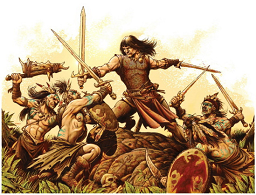 In case at this point you haven’t quite teased out the nuance of my thought: I feel like, with my roleplaying group, I’m forced to choose between two different directions. One of them is OSR, which, even with all its glory, legacy and energy, is regressive. The other one is forward to a new game. Because why must the implications of OSR be that the best way of roleplaying is the old way? Yes, I’m as frustrated as many others with rules bloat. But can it be supposed that, outside of the D&D paradigm, roleplaying has continued to “progress,” that in other games there might be innovations and inspirations that make gaming even more fun than the D&D experience? Maybe we shouldn’t merely be removing rules but playing different rules. Might there be an “OSR” movement more in line with my youthful experience of simply playing different games?
In case at this point you haven’t quite teased out the nuance of my thought: I feel like, with my roleplaying group, I’m forced to choose between two different directions. One of them is OSR, which, even with all its glory, legacy and energy, is regressive. The other one is forward to a new game. Because why must the implications of OSR be that the best way of roleplaying is the old way? Yes, I’m as frustrated as many others with rules bloat. But can it be supposed that, outside of the D&D paradigm, roleplaying has continued to “progress,” that in other games there might be innovations and inspirations that make gaming even more fun than the D&D experience? Maybe we shouldn’t merely be removing rules but playing different rules. Might there be an “OSR” movement more in line with my youthful experience of simply playing different games?
I think the Conan RPG is what I’m going to bring to my group. Doubling down on the idea that I might be able to introduce my players to at most two games before their preferences and openness to change calcifies, this will be the one for me to get in. I love the Conan mechanics, and I feel like I know the game’s best ones already through playing Star Wars. Conan RPG employs a mechanism of Doom counters that allows the GM to introduce dangers and complications that are conducive to storytelling without the impression of arbitrariness or cruelty on the GM’s part. “Hey, it’s part of the game,” the GM can say. This allows the GM to shape the narrative to a considerable degree, through mechanics, and as a storyteller I appreciate this.
The other benefit I have right now for introducing this particular rules set and setting I might owe to A Game of Thrones. My newest player (a GoT enthusiast) has absolutely no interest in magic and wizardry, and I think a contribution to this preference might be George R.R. Martin’s “low-magic” setting. The Conan RPG returns sorcery to its largely conservative — in a religious sense — origins, at least from a Western perspective. Sorcery in Conan not only is rare but morally problematic. All sorcery requires a sacrifice and increasing reliance on dark forces and powers. Sorcery at its pinnacle insists on human sacrifice, and the game takes a line at this consideration to say that no players should be at all interested in using these options in game. Unfortunately, many players I have encountered might be most interested in this part of the game, perhaps making it something that those 80s fundamentalists were most concerned about. Perhaps Conan RPG will be the definitive sword and sorcery game it is advertised to be, with a new generation of young people concerning their parents with unholy rites and devil worship. Cue the 80s metal music!
Gabe – Interesting that the mechanics didn’t faze you at all, as you saw it similar to Star Wars. They were rather alien to me and left me wary.
I backed the ‘every PDF unlocked’ because I love the Hyboria world and I was certain that Modiphius was going to put out excellent books. So basically, I was in for the massive amounts of reading material.
But I don’t know if I’ll be playing this. I look forward to readin through the initial releases, though.
Thanks for reading my overly fraught Apologia, Bob! 🙂
I see the core mechanic as quite “grokable” (and it is similar to Star Wars): the challenge of a task is PC Ability + Skill (well within a range of 10-20). Roll x amount of d20 (usually 2). Any number under the Ability + Skill is a “success.” More successes are scored for rolling within the “Edge” range band by rolling really low numbers like 1s or 2s. If your Edge in a Skill is 2, you get an extra success by rolling a 1 or 2. The Difficulty of tasks is how many “successes” you need.
What’s great about this game is that successes outside of the requirement for the task are not “lost” (it’s not entirely pass/fail like most tests in D&D) but get saved as a resource in a pile that all players have access to in common. This is called Momentum they can spend on later tasks. They also can spend Fortune points to drastically alter outcomes into their favor.
And the GM has Doom tokens that aids him in crafting a story through complications and setbacks to make the PCs lives more difficult — and thereby heroic.
But after reading the whole book, I realize there are aspects that are a lot crunchier than that! I never feel like I really can judge the merits of a game outside of gameplay, and I hope I can play it.
Because yes, unless I can sell it to some group, I just might be reading and not playing it all, too! But ALL of those PDFs for the Kickstarter price is a really good deal! And such quality products, too.
Insightful review! Regarding what Bob said, I can testify that the Modiphius people are being very conscientious about keeping the game true to REH as much as possible.
Dear Mr. Dybing,
I share your ambivalence about the OSR. Having learned roleplaying “back in the day”, I am reluctant to want to fully revive the types of rule-mechanical games we played before we got a bit more narrativist with story-telling RPGs. As much as I dislike the “rules bloat” RPGs for the way that they unavoidably embed the “options” (feats/stunts/powers) into the gameplay, I would not like to return to the “kit-bashed”, different-die-for-every-occasion rules sets of the 1970s.
My first RPG was Empire of the Petal Throne, so, similar to your experience with MERP, I developed a notion of roleplaying as a world- and culture-building exercise first and only afterward an exercise in “leveling up”. The goal was to engage the PCs with the culture and the history, and then the adventures would follow from there.
As for player loyalty to a familiar system, well, “Better the devil you know than …” It can work, though, if you can simplify the character generation and set up the basic mechanics on 1 or 2 pages. That, and be very, very helpful to the confused players.
Thanks so much for your very thoughtful comment, Eugene!
I love the way you characterize our type of gameplay as “world- and culture-building first.” And I hear that _Empire of the Petal Throne_ is immensely conducive to that! Interestingly, I also hear that rules set get included in OSR discussions, mostly because it retains a large and loyal following.
And thanks for your advice on building a two-sheet primer for players. I indeed did that once when I tried to “drift” my Pathfinder game into the Cypher System. I agree that it can work. But I think we can agree that what’s even more important is that all are open to the new game’s “milieu.” And the rules for any given milieu should be constructed specifically to support and emulate that experience.
Interestingly enough, I have a close friend who only ever played one version of D&D, and he only played it in his youth. He’s a writer too, and he shared that in his game his players quickly learned that if something had to happen for a satisfying narrative beat, it was GOING to happen. It became an aspect of the game for them. It also sounds like they were pretty loose with the rules as written, as well.
But he also observes that this might be a fundamental aspect of roleplaying when one is young. He predicts that, when one ages, the rules become more important, more integral to the “social contract” at the gaming table. And with this in mind, adults would be hard-pressed to modify D&D to support just _any_ kind of game play.
So now you have me thinking about Cubicle 7’s _Adventures in Middle-Earth_ for D&D 5e. I wonder just how much of a good job Cubicle 7 does modifying D&D for Middle-Earth, how well the emulation works. This would be out of curiosity alone, mind you, because if I ever wanted to play in Middle-Earth again I definitely would try out _The One Ring_, the system specifically designed for that experience.
Cheers!
Gabe,
Sounds as though you are well-prepared to meet the challenge of “shifting” or “drifting” your players to a new system.
I would say that one major factor is the tone that the system promotes or implicitly embodies. Classic D&D sees the world in terms of stats and HPs, which is why their “sacred” supplements like Gods, Demi-gods, & Heroes come off less like myths and pantheons and more like a Really Big Monster Manual. The gods are PCs writ extra-large. Which, if that perspective does not appeal, undermines the believability of the setting and immersion in the game.
Your friend’s experience with a “rules loose” game early in life and subsequent transition to a more rules-bound outlook mirrors some of my own experience. In my case, though, I found it reverses after a while: I was “rules-loose” (or “rules-free”) in childhood, became much more rules-seeking in adolescence, and then switched to a “rules-lite” maturity (or senescence). So, I can appreciate the challenge of working with a rules-bound group (speaking as someone who has played Chivalry & Sorcery and lived to tell the tales), but if you give it time, they may grow to enjoy a lighter touch.
And I say that as someone who, boggled at the profusion of details in said C&S game, was moved to ask the referee, during an interminable “equip the party” phase, “So, are cucumbers in-season or out-of-season?” (C&S listed different prices by availability!)